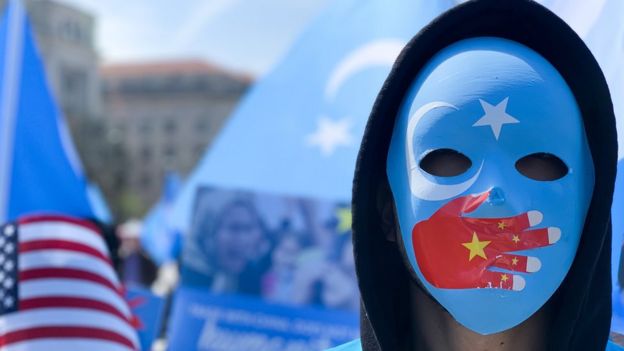US House votes for sanctions on Chinese officials over Uighur treatment

The US House of Representatives has passed a bill to counter what it calls the “arbitrary detention, torture, and harassment” of Uighur Muslims in China.
The bill calls for “targeted sanctions” on members of the Chinese government – and names the Communist Party secretary in the Xinjiang autonomous region, Chen Quanguo.
The bill still needs to be approved by the Senate and President Trump.
China’s foreign ministry reacted angrily, calling the bill “malicious”.
The passing of the bill comes days after Mr Trump signed into law a bill that supports pro-democracy protesters in Hong Kong – leading to condemnation from China.
The Uighur Human Rights Policy Act 2019 bill was passed by 407 to 1 in the House of Representatives on Tuesday night.
Republican Thomas Massie, from Kentucky, voted against the bill. He also voted against the Hong Kong bill.
What’s in the bill?
The purpose of the bill is “to address gross violations of universally recognised human rights, including the mass internment of over 1,000,000 Uighurs”.
It also accuses China of “systematically discriminating” against Uighurs by “denying them a range of civil and political rights, including the freedoms of expression, religion, movement and a fair trial”.
- What’s happened to the vanished Uighurs of Xinjiang?
- Data leak details China’s ‘brainwashing system’
- Searching for truth in China’s ‘re-education’ camps
The bill details some of the policies allegedly carried out by China against Muslims in Xinjiang.
These include:
- “Pervasive, high-tech surveillance, including the collection of DNA samples from children.”
- “The use of QR codes outside homes to gather information on how frequently individuals pray.”
- “Facial and voice recognition software and “predictive policing” databases.”
The Uighur bill calls for sanctions on Chinese officials who are “credibly alleged to be responsible for human rights abuses in Xinjiang”.
It also names Xinjiang’s Communist Party boss Chen Quanguo, who has been dubbed the “architect” of the camps.
The bill calls on Mr Trump to “condemn abuses” against the Uighurs, for China to immediately close all the camps, and to “ensure respect for internationally-guaranteed human rights”.
 Image copyrightANADOLU AGENCY
Image copyrightANADOLU AGENCYWhat was the reaction in China?
China’s foreign ministry called the bill “malicious” and urged the US to stop “interfering in China’s domestic affairs”.
“The bill deliberately smears the human rights condition in Xinjiang and viciously attacks the Chinese government’s Xinjiang policy,” said foreign ministry spokesperson Hua Chunying.
“We urge the US to correct its mistakes at once, prevent this bill from becoming law, and stop using Xinjiang-related issues to interfere China’s internal affairs.”
China also reacted angrily to the Hong Kong bill – suspending visits by US Navy ships and aircraft to Hong Kong, and issuing sanctions against US-based human rights groups.

What’s going on in Xinjiang?
Rights groups say that hundreds of thousands of Muslims are detained in high-security prison camps across Xinjiang.

The Chinese authorities say the Uighurs are being educated in “vocational training centres” in order to combat violent religious extremism.
But evidence shows many are being detained for simply expressing their faith – for example, praying or wearing a veil – or for having overseas connections to places like Turkey.
- China rebukes US for backing Hong Kong protesters
- Hong Kong protests explained in 100 and 500 words
- US blacklists China entities over ‘Uighur abuse’
Records seen by the BBC show China is also deliberately separating Muslim children from their families.
This is an attempt to “raise a new generation cut off from original roots, religious beliefs and their own language,” Dr Adrian Zenz, a German researcher told BBC News earlier this year.
“I believe the evidence points to what we must call cultural genocide.”
China’s ambassador to the UK denied the allegations, saying they were “lies”.
Related News

Iran protest movement subsides after waves of unrest
TEHRAN, JAN 16: Tensions in Iran have subsided after three weeks of protests under anRead More

Putin calls for multi-polar world
MOSCOW, JAN 16 /DNA/ – Russian President Vladimir Putin, addressing a ceremony for newly appointedRead More


Comments are Closed